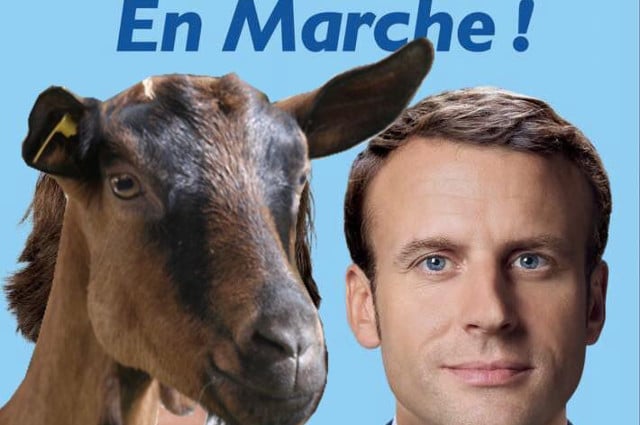The theory has been aired several times over the last week: French voters were so desperate for change and for new President Emmanuel Macron to succeed that they blindly elected his party's candidates to parliament.
Macron's Republic on the Move (REM) party and its allies won a massive majority in the French parliament on Sunday, indeed one of the biggest majorities in decades.
Political analyst Christophe Barbier suggested after the first round of voting in parliamentary elections a week ago that “you could take a goat and give it Macron's endorsement and it would have a good chance of being elected.”
Senior left-wing journalist Edwy Plenel expressed the same sentiment, saying that even “donkeys” would be carried to power by the Macron wave such was its force. “Absolute power is a danger,” he warned.
Christophe #Barbier : ” Aujourd'hui vous prenez une chèvre, vous mettez #Macron dessus, elle a des chances d'être élue ! ” #LREM #EnMarche pic.twitter.com/FKS7LDUwj3
— Richard Findykian (@rfindykian) June 12, 2017
In line with the 39-year-old's presidential campaign pledges, around half of REM's candidates are newcomers to politics drawn from diverse fields of academia, business or local activism. Around half are women.
The result means a national assembly that is younger, more female and more ethnically diverse than ever before.
But also more inexperienced and perhaps less willing to stand up to the all-powerful president.
Defeated candidates in last weekend's voting also took up the animal-themed commentary about the strength of anti-establishment feeling and support for Macron's candidates.
Eduardo Rihan Cypel, a defeated Socialist from northern France, said a REM-sponsored “hippopotamus” would have beaten him in his constituency. Party colleague Alexis Bachelay sniffed that a Macron-aligned “field mouse” could get 40 percent in the current climate.
#FnVarCirco2 #Législatives2017 ne laissez pas la chèvre #Macron entrer à l'Assemblée Nationale. Votez #Patriote ? pic.twitter.com/fDUFAsXZj5
— Aline Renck-Guigue (@RenckG) June 16, 2017
Desire for change
In some areas in Paris, stickers of goats have been placed on the posters of REM candidates outside polling stations, while right-wing opponents online have taken up the theme on Twitter.
One target this week was Olivia Gregoire who was standing for a seat from a constituency in wealthy southwest Paris and whose posters, like most REM candidates, feature Macron's face prominently.
The entrepreneur was on course for victory on Sunday after winning 47 percent in the first round of the parliamentary election last week against veteran rightwinger Philippe Goujon who has held the seat since 2007.
“The desire for change is really strong, which means that people have less concern about voting for someone they don't know,” said Romain Perron, a 33-year-old who works in finance, after casting his vote.
Macron's success has been partly built on the overwhelming desire of voters to cast out the familiar faces of France's political class who are blamed for years of low growth, corruption, social tensions and high unemployment.
“People are tired of always seeing the same faces,” said Natacha Dumay, a 59-year-old teacher voting in the northeastern Paris suburb of Pantin where Socialist former justice minister Elisabeth Guigou was voted out a week ago.
“Even if we don't know the new faces it's not important. We're not voting for individuals but for a programme,” Dumay added.
The former investment banker was unknown three years ago and only started his political movement in April last year, promising to modernise France's social security system and promote entrepreneurship.
Other supporters said that the animal comparisons were condescending towards voters and ignored the fact that other presidents won huge majorities in 1968, 1981 or 2002.
“We are in a system that offers a majority to the president once he's elected,” said Sandrine, a 48-year-old civil servant.
Following a referendum in 2000, France's electoral calendar was modified to place the parliamentary polls immediately after the presidential one with the explicit aim of giving the new president a working majority.
“It should give him the chance to reform and our country needs reforms,” Sandrine added.
Furthermore, many REM candidates — especially those in rural constituencies — are known locally, living in the area or working for local associations.
Macron hegemony?
Others are not convinced, worried that Macron will have too much power and nface no scrutiny from a parliament packed with loyalists who owe their election success to him.
Samuel Sharifzadeh, a 66-year-old voting in southwest Paris, said he backed Macron in the presidential election but supported an opposition figure on Sunday to encourage a counterweight in parliament.
Retired businessman Patrick Depardon, 65, said he was dismayed at the prospect of sitting MPs with a good track record being voted, merely to fulfill the desire for renewal.
“We're throwing the baby out with the bathwater,” Depardon said.




 Please whitelist us to continue reading.
Please whitelist us to continue reading.